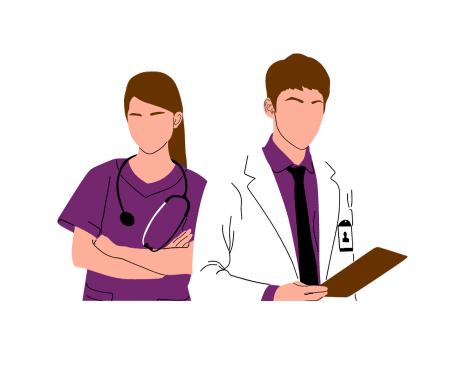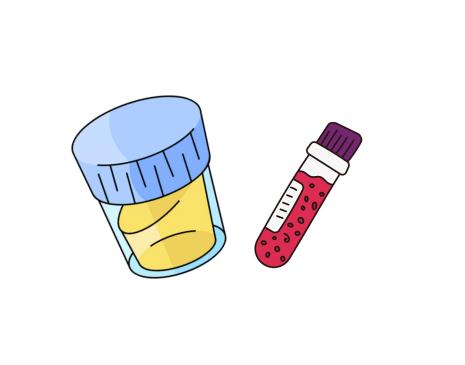Sexually transmitted diseases (STDs) are more common than you might think, and getting tested is a vital step in taking control of your well-being. Our guide will walk you through the why, when, and how of STD testing, making it easy to understand and navigate. Whether you’re curious, concerned, or just want to stay informed, we’ve got you covered.
From the basics of what STDs are and how they spread to the different testing methods available, we’ll cover it all. No judgement – just the essential information you need to make empowered choices about your sexual health.
How to Get Tested for STDs
In Australia, getting a sexual health check is a straightforward process, and there are multiple options available. Here’s a simple guide on how to get tested for STDs in Australia:
Visit a Sexual Health Clinic
Sexual health clinics are specialised facilities that provide a free and confidential service for sexually active individuals to get tested. You can find these clinics in major cities and regional areas. Simply locate a clinic near you, make an appointment, and visit for testing.
See Your General Practitioner (GP)
You can also consult your regular doctor or health professional for STD testing. GPs can provide guidance, discuss your concerns, and order the necessary tests. They may perform some tests in their clinic or refer you to a specialised clinic.
Order a Home Testing Kit
Some organisations offer discreet and convenient home testing kits. You can order these kits online, collect your samples at home, and send them back to the testing facility. Results are often delivered confidentially through secure channels.
Use Testing Services at Family Planning Clinics
Family planning clinics across Australia offer sexual health services, including STD testing. These clinics are staffed with health professionals who can address your concerns and provide necessary testing.
Attend Outreach Programs
In certain communities or during specific events, mobile health units or outreach programs may offer free or low-cost STD testing. Keep an eye on local announcements or health campaigns for these opportunities.
Access Public Health Services
Public health services like state or territory health departments may provide STD testing. Check with your local health authority to find out about available services and testing locations.
Check Online Platforms
Various online platforms and telehealth services in Australia provide options for STD testing. Just ensure that these services comply with Australian health standards and regulations.
Remember, testing is confidential, and healthcare professionals are there to support you. It’s important to communicate openly about your concerns, symptoms, or any risky behaviours to ensure you receive appropriate testing and guidance.

What is an STD Test?
An STD test, or sexually transmitted disease test, is a medical examination to determine the presence of infections that are transmitted through sexual activity.
The test aims to identify whether an individual has contracted a sexually transmitted infection (STI) by detecting the presence of pathogens, such as bacteria, viruses, or parasites, in the body. Here’s a breakdown of what typically happens during an STD test:
- Consultation and Assessment: Before the actual testing, you’ll have a consultation with a healthcare professional. This may be a doctor, nurse, or other qualified personnel. During the consultation, you’ll discuss your sexual history, sexual partners, any noticeable symptoms you may be experiencing, and potential exposure to risk factors.
- Physical Examination: In some cases, a physical examination may be conducted to check for visible signs of infection, such as sores or rashes. This depends on the specific STD being tested for.
- Sample Collection: The type of sample collected depends on the specific STD being tested. These include blood sample, urine sample, swabs from genital, oral, or rectal areas, and in some cases, saliva or other bodily fluids. Blood tests are often used to detect antibodies or antigens produced by the body in response to infection.
- Laboratory Testing: The collected samples are sent to a laboratory for analysis. Various laboratory techniques, such as polymerase chain reaction (PCR), enzyme-linked immunosorbent assay (ELISA), or culture methods, may be employed to identify the presence of pathogens.
- Results and Counselling: Once the laboratory results are available, you’ll be informed of the findings. If the results are positive for an infection, your healthcare professional will discuss treatment options, potential complications, and preventive measures. Confidentiality is a crucial aspect of this process.
It’s important to note that different STDs require different testing methods, and not all testing may be performed in the same way. The specific tests conducted will depend on factors such as symptoms, risk factors, and sexual history.
Regular STD testing is essential for maintaining sexual health, as many infections may not cause immediate symptoms but can lead to complications if left untreated. Being proactive about testing helps in early detection and appropriate management of sexually transmitted infections.
How Do They Test for STDs?
Testing for sexually transmitted diseases involves various methods depending on the specific infection being screened. Here’s an overview of common testing methods for different STDs:
Blood Tests
- HIV: Human Immunodeficiency Virus (HIV) is often diagnosed through a blood test that detects antibodies or antigens produced in response to the virus. Rapid HIV tests can provide results in minutes.
- Syphilis: Blood tests, including Rapid Plasma Reagin (RPR) or Venereal Disease Research Laboratory (VDRL) tests, are used to detect antibodies produced in response to syphilis infection.
Urine Tests
- Chlamydia and Gonorrhoea: Urine samples are commonly used to test for these bacterial infections. Polymerase chain reaction (PCR) or nucleic acid amplification tests (NAATs) can identify the DNA of the bacteria in the urine.
Swab Tests
- Genital Herpes: Swabs are taken from genital sores or ulcers to identify the herpes simplex virus (HSV) . Polymerase chain reaction (PCR) tests on the swab sample can confirm the presence of the virus.
- Chlamydia and Gonorrhoea: Swabs may be collected from the genital, oral, or rectal areas to test for these infections. Ever wondered – can you get chlamydia without sex?
Fluid Sample Tests
- Syphilis: In addition to blood tests, fluid from syphilis sores or lesions can be examined under a microscope for the presence of the bacterium causing syphilis.
Physical Examination
- A healthcare professional may visually inspect the genital, oral, and rectal areas for signs of infection, such as sores, rashes, or warts.
Pap Smear
- HPV (Human Papillomavirus): Pap smears or HPV DNA tests are used to detect the presence of high-risk strains of HPV that can lead to cervical cancer in women. Learn more about cervical cancer screenings .
Rectal and Throat Swabs
- Chlamydia and Gonorrhoea: Swabs may be taken from the throat or rectum if there is a risk of infection in these areas, especially in individuals engaged in anal or oral sex ( here’s everything you need to know about oral sex and STIs ).
Testing methods may vary, and healthcare professionals will recommend specific tests based on factors such as symptoms, risk factors, and sexual history. Advancements in testing technologies continue to improve the accuracy and efficiency of STD testing. Regular screenings, open communication with healthcare providers and your sexual partner, and practising safe sex are essential components of maintaining sexual health.

Where to Get an STD Test
In Australia, there are several options for getting an STD test. Here are some places where you can get tested for sexually transmitted infections (STI’s):
Sexual Health Clinics
Sexual health clinics specialise in reproductive and sexual health. They offer confidential testing, counselling, and treatment for a range of STIs. You can find sexual health clinics in major cities and regional areas.
General Practitioners (GPs)
Your regular doctor or general practitioner can provide guidance on STI testing. They may conduct some tests in their office or refer you to a specialised clinic for further testing and treatment.
Family Planning Clinics
Family planning clinics across Australia provide sexual health services, including STI testing. These clinics are staffed with healthcare professionals who can address your concerns and provide necessary testing.
Public Health Services
State or territory health departments often offer STI testing services. You can check with your local health authority to find out about available services and testing locations.
Community Health Centres
Community health centres may provide STI testing services. These centres aim to offer accessible healthcare to local communities; some may have sexual health services available.
Online Platforms and Telehealth Services
Some online platforms and telehealth services offer discreet and convenient STI testing. You can order home testing kits, collect samples at home, and send them back for analysis. Make sure to use reputable and regulated services.
Outreach Programs and Mobile Health Units
During specific events or in certain communities, mobile health units or outreach programs may offer free or low-cost STI testing. Keep an eye on local announcements or health campaigns for these opportunities.
University Health Services
If you’re a student, university health services often provide STI testing as part of their healthcare offerings. Check with your university’s health centre for information.
Pharmacies
Some pharmacies may offer STI testing services, either through in-store testing or by providing home testing kits. Check with your local pharmacy for available options.
When considering where to get tested, choosing a reputable and confidential service is important. Confidentiality is a priority in sexual health testing, and healthcare professionals are bound by privacy laws to protect your information. If you have specific preferences or concerns, don’t hesitate to discuss them with the healthcare provider or clinic staff.
Remember, regular STI testing is a responsible and proactive step in maintaining your sexual health. If you have any symptoms or concerns or have engaged in risky behaviour, getting tested is crucial for early detection and timely treatment.
Treat STDs fast with Youly! »Disclaimer: The information provided in this blog is for general informational purposes only and is not intended to be a substitute for professional medical advice, diagnosis, or treatment. Always seek the advice of your physician or other qualified health provider with any questions you may have regarding a medical condition. Never disregard professional medical advice or delay in seeking it because of something you have read on this blog. Reliance on any information provided in this blog is solely at your own risk. The health and medical information on this site is provided “as is” without any representations or warranties, express or implied.

